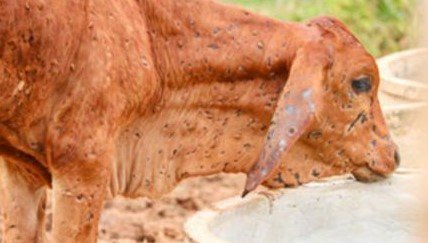India has taken a significant step in combating lumpy skin disease (LSD) among cattle and buffaloes, with its drug regulatory authority approving a pioneering vaccine that not only protects livestock but also helps distinguish infected from vaccinated animals.
India Approves DIVA Marker Vaccine to Contain LSD Outbreak
Biovet, an Indian animal vaccine manufacturer, announced on Monday that the Central Drugs Standard Control Organisation (CDSCO) had granted approval for Biolumpivaxin, a novel vaccine developed in collaboration with the Indian Council of Agricultural Research (ICAR). The vaccine, based on genetic markers, allows authorities to track disease outbreaks effectively and implement targeted vaccination efforts.
Lumpy skin disease, a highly contagious viral infection, has devastated India’s livestock industry since 2022, causing over 200,000 cattle deaths across multiple states. The disease spreads primarily through insect bites, leading to fever, painful skin nodules, and reduced milk production, significantly impacting dairy farmers.
“This DIVA marker vaccine could be a breakthrough in veterinary medicine for disease surveillance, outbreak control, and eradication efforts,” Biovet founder Krishna Ella said in a statement.

Economic and Agricultural Impact of LSD
The outbreak of LSD has had a severe financial impact on India’s dairy sector, particularly for small-scale farmers who rely on cattle for their livelihood. The disease not only affects milk production but also weakens the animals, making them more vulnerable to secondary infections.
ICAR’s 2022 report highlighted the extent of the damage, documenting LSD cases across 251 districts in 15 states. The highest mortality rates were observed in lactating and pregnant cattle, whose milk production serves as a direct source of income for farmers.
• Farmers in states like Rajasthan, Gujarat, and Punjab reported significant losses due to the disease.
• The Indian government allocated emergency funds to contain the spread but struggled with vaccine availability until now.
• Several state administrations imposed restrictions on cattle movement to prevent further transmission.
With the introduction of Biolumpivaxin, authorities expect better control over the disease, reducing economic strain on affected regions.
How the Biolumpivaxin Vaccine Works
The vaccine’s unique differentiation of infected from vaccinated animals (DIVA) feature sets it apart from traditional LSD vaccines. By using genetic markers, veterinarians can quickly distinguish between natural infections and vaccinated cattle through blood tests. This advancement is expected to streamline vaccination campaigns and allow for more precise disease monitoring.
Traditional vaccines often complicate disease management, as there is no clear way to identify which animals have been infected versus vaccinated. With Biolumpivaxin, unvaccinated animals can be promptly identified and immunized, ensuring more comprehensive disease control.
Government and Veterinary Experts Weigh In
Veterinary experts and government officials have welcomed the approval of Biolumpivaxin, considering it a major leap in India’s efforts to combat LSD. The Indian animal husbandry and dairying department has been working closely with ICAR and Biovet to ensure widespread distribution of the vaccine.
“Farmers have been struggling to protect their livestock. This vaccine gives us a much-needed tool to prevent large-scale losses,” a senior government official stated.
However, challenges remain. While the vaccine offers hope, ensuring its availability in remote areas and educating farmers on its benefits will be crucial in achieving long-term success.
Future Outlook: A Step Towards Disease Eradication?
India has been grappling with LSD since it first entered the country six years ago, likely from Africa. The virus, which spreads through flies, mosquitoes, and ticks, has since become a persistent threat to the dairy industry.
The approval of Biolumpivaxin could mark a turning point. If vaccination coverage reaches a critical threshold, experts believe the country could significantly reduce, if not eliminate, LSD outbreaks in the coming years.
For now, India’s livestock sector has a renewed sense of optimism, as the new vaccine promises to curb infections, protect farmers’ livelihoods, and secure the future of the dairy industry.
